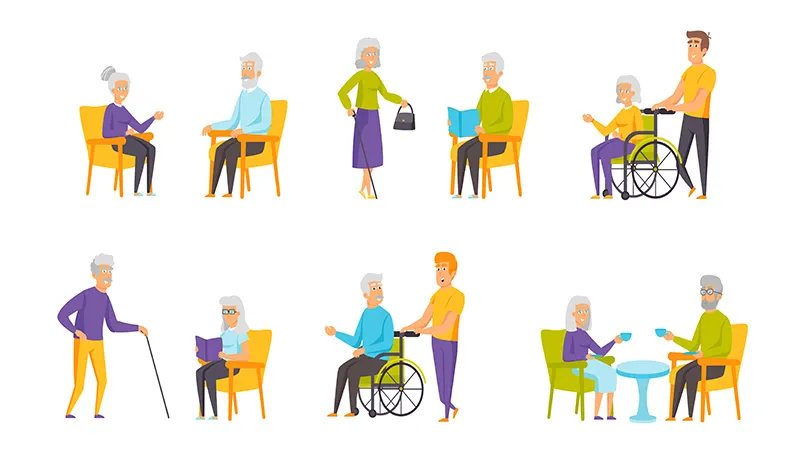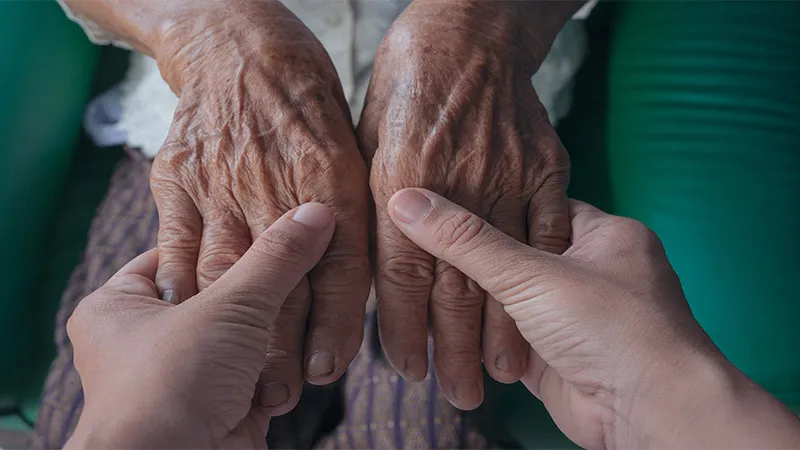Health and Social Care
What is the Main Principle of the Care Act 2014
According to the Act, evaluation, care and support planning, and review must include adults. In addition, a person-centred system must take into account the person’s opinions and desires. Further, with person-centred care and support planning of a person can get all of their personal financial plans as a direct payment. Also, the principles of the Care Act 2014 are to develop the independence of people and wellness by inspiring care providers and givers to take a person-centred approach to the care and support they provide.
Moreover, this act begins by exploring the prime responsibilities of the legal authorities to promote individual wellbeing. Therefore, by analysing the act, we can understand that the major goal of adult care is to help people get the life outcomes that are essential for them.
The care act begins by exploring the prime responsibilities of the legal authorities to promote individual wellbeing. By analysing the act, we can understand that the major goal of adult care is to help people get the life outcomes that are essential for them. In the first place, these principles of the Care Act suggest that one must involve adults in the evaluation, care and support arrangement and analysis. Further, under person-centred care and support planning, a person can get part of their personal budget as a direct payment.
However, to provide people with the most control over how they are inspired and supported, by whom they are supported and where they are supported are designed by direct payments.
To find out the principles of the Care Act 2014, take a look at this blog.
Table of Content
What is the Care Act?
History
As per Wikipedia The Care Act, 2014 was introduced on 9 May 2013 and given royal assent on May 14, 2014, to update England’s 60- year-old social care legislation. Besides, in April 2015, the Care Act 2014 was implemented to restructure the social-care system and alter how older people and individuals with disabilities were cared for and supported.
Care Act
The Care Act of 2014 is a law that identifies how adult social care should be given in England. Most importantly, the local governments must ensure that citizens in their jurisdictions get services that prevent their care needs from becoming more serious.
The Care Act clarifies that the local authorities should perform their duties to develop people’s well-being. As a matter of fact, the Care Act alters different aspects of helping people and the goal is to support people who require more power and influence.
Recognise the duty of care in health and social care with this blog.
 Are you looking for a Health and Social Care Course?
Are you looking for a Health and Social Care Course?
Different Types of Care Act
Let’s find out some different types of Care Act, which are explained below.
Health and Social Care Act 2012
According to Health and Social Care Act 2012, the following duties must be completed along with ensuring each Clinical Commissioning Group (CCG). The following responsibilities are:
- Minimise disparities between patients in terms of their ability to access health care.
- Further, minimise disparities between patients in terms of the outcomes they attain.
- Inspire patients and their caregivers to participate in decisions about the health services they receive.
- Lastly, allow patients to make choices about the types of health treatments they get.
Social Services and Well Being Act 2014
In the year 2016, on 6 April, the Social Services and Well-being (Wales) Act was introduced to enhance the well-being of persons who require care and support and to change their social services in Wales (source: Social Services and Well-being (Wales).
The important principle of the act includes the following:
- Control and voice
- Early intervention and prevention
- Well-being
- Co-production
Why Care Act is Important?
The Care Act plays a vital role in encouraging people’s independence and satisfaction. In addition to this, the main motive of the principles of the Care Act is that governments must arrange services to help people keep away from developing care and support needs for their deterioration to the point where they would need uninterrupted care and support. Further, the Care Act promotes well-being and helps adults who are vulnerable and need funding.
As we know, the Care Act of 2014 has changed the scenery of the United Kingdom. Care and support are essential for every human being. Even if we don’t need to care for ourselves, we will probably know a family member or friend who does or may care for someone.
We have listed the 20 most enjoyable parts of care work. Check out this blog for more information.
What Do You Mean by Principles?
We can explore the term principles as it means to take a stand for the truth, law or the inspiring force on which others are based. A principle can also be defined as the value that can lead to the development of the behaviour and the law that needs to be followed. Therefore, understanding the principles is important as it gives us an idea of how and why things happen.
Six Principles of Care Act 2014
The Principles of Care Act involves six assumptions. To take a person-centred approach when safeguarding vulnerable adults, the principles of the Care Act inspire caregivers. Further, the regulation of Care Act principles shows how to improve the care providers and givers to promote Care Act principles.
The six principles of the Care Act 2014 are:
-
Empowerment
By analysing the concept of the principles of the Care Act, we find out that the empowerment principle aims to create encouragement to help and support vulnerable adults. The main goal is to ensure that vulnerable adults should not feel helpless in any situation.
-
Protection
Another important principle of the Care Act is protection. Protection indicates the representation of supporting and helping adults whenever they need it. Specifically, this principle shows that we should fulfil the care needs of an adult.
To protect those in need, we must identify the sign of abuse so that we can contact the appropriate authority to provide protection.
-
Prevention
One of the most crucial principles of the Care Act is prevention. The main focus of prevention is one must take action before the injury occurs.
As we know, Abuse and mistreatment have long-term results for anyone, regardless of their age. Hence, they may experience emotional or physical pain even after being free of abuse and living in a secure environment.
-
Proportionality
The proportionality concept refers to the minimum intrusive approach to risk.
Also, responding to a protection concern in the most understated manner is feasible.
It entails taking into account the vulnerable person’s requirements. When dealing with abuse or neglect, this guarantees that each choice takes the vulnerable adult into account.
-
Partnership
This principle shows that it is necessary to work with different local communities. In preventing and protecting others from abuse, local people and authorities also have a crucial part to play. Further, to assist in preventing neglect and abuse, authorities can work with local agencies and communities.
It will not only make detection and reporting easier but also increase the likelihood of an adult receiving assistance.
-
Accountability
The view of accountability guarantees that safeguarding is transparent. Subsequently, the people in charge of protecting vulnerable folks are accountable for safeguarding them.
Further considering the safeguarding responsibilities, everyone involved has to be aware. In addition, they need to keep in mind the warning indicators and how to assist adults in distress. Lastly, the principle of accountability ensures that everyone needs to protect risky adults and individuals.
Process of Ensuring Care Act
The key principles of the Care Act aim to develop its vision which involves ensuring the well-being of people who need care, help and support. Here, the Care Act principles of safeguarding show that the organisations or authority needs to protect people.
The process also identifies the personalisation of care services and it also makes sure that the person is at the focal point of the procedure.
What Did the Care Act 2014 Do?
The Care Act 2014’s core premise is to support people’s independence and wellness by encouraging care providers and givers to take a person-centred approach to the care and support they provide.
The main goal of adult care and support is to assist people in achieving the life outcomes that are important to them.
According to the Act, evaluation, care and support planning, and review must include adults. A person-centred system must take into account the person’s opinions and desires. Person-centred care and support planning of a person can get all of their personal financial plans as a direct payment.
What is the Care Act 2014 Simplified?
By analysing the key principles of the Care Act 2014, we can understand that the Care Act 2014 is simplified as it is aimed to create arrangements, services and facilities to help the improvement of needs for support and safekeeping. The local authorities must ensure all these things.
What are the Nine Areas of Well-Being Defined in the Care Act?
As per the Social Care Institute for Excellence, the well-being principles of the Care Act 2014 are a comprehensive idea which is a vital part of the principles of the Care Act. The nine areas of well-being involve:
- Personal honour includes the behaviours towards the individual with esteem.
- Emotional strength along with physical and mental wellness.
- Protecting from abuse and abandonment.
- Also, the ability of individuals over their day-to-day activities involves the support and protection they are provided.
- Involvement in work, education, training and enjoyment.
- This also includes economic and social well-being.
- Domestic, familial, and private spheres.
- In addition, it has adequacy of the individual’s living quarters.
- Lastly, it adds to the individual’s contribution to society.
Is the Care Act 2014 a Legislation?
Care Quality Commission, The Care Act 2014 is the legislation designed to instruct how social care should be delivered to adults in England. Additionally, it requires local governments to ensure that residents in their jurisdictions receive services that prevent their care needs from becoming more severe or delay the impact of their needs.
Top Courses of this Category
Who Does the Care Act Protect?
The Care Act of 2014 establishes a legislative framework for adult safety. As per this act, an adult at risk is defined as a person above the age of 18 who needs care and support and also is a victim of abuse or neglect. Consequently, the main goal is to promote the prevention of abuse which includes adult clients who receive government-funded care or assistance.
What is the Difference Between Law and Principle?
As stated by Sciencing, laws are only appropriate in specific circumstances to all objects in any case setting. On the other hand, to govern the behaviour of specific scientific phenomena a principle governs the behaviour. In short, we can say that a principle provides guidance and law instruct us on different rules and regulations.
Conclusion
The principles of the Care Act play a vital role in empowering vulnerable adults to take part in the safeguarding processes so that they can get the best appropriate care. Lastly, I hope this article has assisted you in understanding the main principles of the Care Act 2014.
FAQ
What are the 6 principles of the Care Act?
The 6 principles of the Care Act include empowerment, protection, prevention, proportionality, partnership, and accountability.
What did the Care Act 2014 do?
Care Act 2014 involves various activities such as promoting an individual’s “wellbeing”.
Why are the 6 principles of safeguarding important?
The 6 principles of safeguarding are important as the primary goal of these principles is to create the best service possible to protect vulnerable patients.
What are the 7 principles of care?
The seven principles of care involve:
- Constructive communication and relationship
- Supporting anti-discriminatory tactics
- Confidentiality of information
- Rights to independents
- Appreciating individuals believe
- Protecting from abuse
- Individualised care
How many safeguarding principles are there?
There are six safeguarding principles which are created to safeguard adults.
Why is the Care Act important?
The Care Act is important because it helps develop people’s independence and well-being.
Who does the Care Act protect?
Someone over 18 years old who needs support or is experiencing a risk of abuse needs to be protected by the Care Act.
What is Section 22 of the Care Act?
Section 22 includes exceptions for giving healthcare services.
Is the Care Act 2014 a legislation?
Yes. It is legislation which is designed to take adult social care in England.
How do you set principles?
For setting a principle, we need to take a stand by understanding which value is important for us.
What values are important in healthcare?
The important values involved with healthcare are respecting individuals, healthcare justice, responsibility for ethical practice etc.
What is Section 42 Care Act?
Section 42 of the Care Act 2014 shows that the local authorities must execute their activities or tell others to do so if there are some situations where an adult is experiencing risk of abuse or abandonment.
What to Read Next:
- What are the Caldicott Principles? Principles of Caldicott
- What is the Most Difficult Part of Care Work? 20 Difficult Parts of Care Work!
- Child Development Theorists Cheat Sheet – Everything you Need to Know
- How to become a Social Worker – A Complete Guide
- Environmental Factors That Affect Child Development
- How to Become a Mental Health Support Worker?
- Can Social Services Force Someone Into a Care Home

















